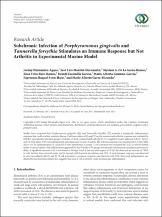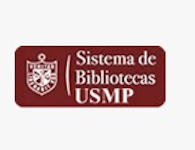Subchronic Infection of porphyromonas gingivalis and tannerella forsythia stimulates an immune response but not arthritis in experimental murine model

Ver/
Trabajo
(application/pdf: 1.692Mb)
(application/pdf: 1.692Mb)
Fecha
2017-06-06Autor(es)
Hernández-Aguas, Jorday
Montiel-Hernández, José Luis
De La Garza-Ramos, Myriam A.
Ruiz-Ramos, Rosa Velia
Escamilla García, Erandi
Guzmán-García, Mario Alberto
Ayón-Haro, Esperanza Raquel
Garza-Elizondo, Mario Alberto
Metadatos
Mostrar el registro completo del ítemResumen
Studies have proposed that Porphyromonas gingivalis (Pg) and Tannerella forsythia (Tf) promote a nonspecific inflammatory response that could produce systemic disease. Oral inoculation of Pg and Tf on the immune and arthritis response was evaluated in BALB/C mice divided into four groups: (1) sham; (2) food contaminated with Pg/Tf; (3) complete Freund’s adjuvant (CFA) + Pg/Tf; and (4) CFA alone. CFA was administered subcutaneously on days 1 and 14. The arthritis response was monitored for 21 days after day 14 of CFA administration. IL-1β and IL-6 were determined in serum. T cell activation was evaluated by CD25 in salivary lymph nodes or mouse spleen. Pad inflammation appeared by day 19 in the CFA group, but animals with bacteria inoculation presented a delay. A significant increase in IL-6 was found in Groups 3 and 4, but not with respect to IL-1β. We observed an increase in CD25 in cells derived from cervical nodes and in animals with bacteria inoculation and CFA. A local immune response was observed in mice inoculated with Pg and Tf (T cell activation); a systemic response was observed with CFA. Since pad inflammation was delayed by bacterial inoculation this suggests that local T cell activation could decrease pad inflammation.
Colecciones
- Artículos [274]
Editor
Hindawi
Acceso
info:eu-repo/semantics/openAccess
Financiamiento
ProyectoProinnova-CONACYT Steripharma, Grant no. 141616.







